Parker Theodore
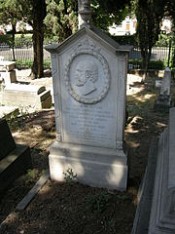
Theodore Parker (August 24, 1810 – May 10, 1860) was an American Transcendentalist and reforming minister of the Unitarian church. A reformer and abolitionist, his own words and quotes he popularized would later influence Abraham Lincoln and Martin Luther King, Jr. Theodore Parker was born in Lexington, Massachusetts,[1] the youngest child in a large farming family. His grandfather was John Parker, the leader of the Lexington militia at the Battle of Lexington. Most of his family had died[2] by the time he was 27, probably due to tuberculosis. He was educated privately and through his personal study until he attended Harvard College and graduate in 1831. He then entered the Harvard Divinity School and graduated in 1836.[1] Parker specialized in a study of German theology. He was drawn to the ideas of Coleridge, Carlyle and Emerson. Parker spoke Latin, Greek, Hebrew, and German. His journal and letters show that he was acquainted with many other languages, including Chaldee, Syriac, Arabic, Coptic and Ethiopic. He considered a career in law but his strong faith led him to theology. Parker held that the soul was immortal, and came to believe in a God who would not allow lasting harm to any of his flock. His belief in God's mercy made him reject Calvinist theology as cruel and unreasonable. Parker studied for a time under Convers Francis, who also preached at Parker's ordination ceremony.[3] In the 1830s, Parker began attending meetings of the Transcendental Club and became associated with Ralph Waldo Emerson, Amos Bronson Alcott, Orestes Brownson, and several others.[4] Unlike Emerson and other Transcendentalists, however, Parker believed the movement was rooted in deeply religious ideas and did not believe it should retreat from religion.[1] While he started with a strong faith, with time Parker began to ask questions. He learned of the new field of historical higher criticism of the Bible, then growing in Germany, and he came to deny traditional views. Parker was attacked when he denied Biblical miracles and the authority of the Bible and Jesus. Some felt he was not a Christian, nearly all the pulpits in the Boston area were closed to him,[5] and he lost friends. In 1841, he presented a sermon titled A Discourse on the Permanent and Transient in Christianity, espousing his belief that the scriptures of historic Christianity did not reflect the truth.[1] In 1842 his doubts led him to an open break with orthodox theology: he stressed the immediacy of God and saw the Church as a communion looking upon Christ as the supreme expression of God. Ultimately, he rejected all miracles, and saw the Bible as full of contradictions and mistakes. He retained his faith in God but suggested that people experience God intuitively and personally and it is in that individual experience that people should center their religious beliefs.[1] Parker accepted an invitation from supporters to preach in Boston in January 1845. He preached his first sermon there in February. His supporters organized the 28th Congregational Society of Boston in December and installed Parker as minister in January 1846.[2] His congregation, which included Louisa May Alcott, William Lloyd Garrison, Julia Ward Howe, and Elizabeth Cady Stanton, grew to 7000.[7] Parker was a homeopathic patient of William Wesselhoeft and he spoke the oration at his funeral [8] He also supported Elizabeth Palmer Peabody's Foreign Library where many intellectuals gathered.[9] Parker's ill health forced his retirement in 1859.[7] He developed tuberculosis and departed for Florence, Italy where he died on May 10, 1860, less than one year before the Union split. He sought refuge in Florence because of his friendship with the Brownings [Elizabeth Barrett and Robert Browning], Isa Blagden and F.P. Cobbe, but died scarcely a month following his arrival. Frances P. Cobbe collected and published his writings in 14 volumes; a headstone by Joel Tanner Hart was later replaced by one by William Wetmore Story. Other Unitarians buried in this cemetery include Thomas Southwood Smith and Richard Hildreth. Fanny Trollope, who is also buried here, wrote the first anti-slave novel and Hildreth wrote the second. Both were used by Harriet Beecher Stowe for Uncle Tom's Cabin. Frederick Douglass came straight from the railroad station to visit Parker's tomb. [10] After Parker's death, his ministry continued until 1889. Parker's grave is in the English Cemetery, Florence.[11] As Parker's early biographer John White Chadwick wrote, Parker was involved with almost all of the reform movements of the time: "peace, temperance, education, the condition of women, penal legislation, prison discipline, the moral and mental destitution of the rich, the physical destitution of the poor" though none became "a dominant factor in his experience" with the exception of his antislavery views.[12] Parker's abolitionism became his most controversial stance, at a time when the American union was beginning to split over slavery.[13] He wrote the scathing To a Southern Slaveholder in 1848, as the abolition crisis was heating up. Parker defied slavery[14] and advocated violating the Fugitive Slave Law of 1850, a controversial part of the Compromise of 1850 which required the return of escaped slaves to their owners. Parker worked with many fugitive slaves, some of whom were among Parker's congregation. As in the case of William and Ellen Craft,[15] he hid them in his home and, although he was indicted, he was never convicted.[5] During the undeclared war in Kansas (see Bleeding Kansas and Origins of the American Civil War) prior to the actual outbreak of the American Civil War, Parker supplied money for weapons for free state militias. As a member of the Secret Six, he supported the abolitionist John Brown, whom many considered a terrorist, and wrote a public letter, "John Brown's Expedition Reviewed," defending John Brown's actions after his arrest, defending the right of slaves to kill their masters. Boston's Unitarian leadership opposed Parker to the end, but younger ministers admired him for his attacks on traditional ideas, his fight for a free faith and pulpit, and his very public stances on social issues such as slavery. The Unitarian Universalists now refer to him as "a canonical figure—the model of a prophetic minister in the American Unitarian tradition."[2] In 1850, Parker quoted and made popular the words of John Wycliffe in his prologue to the first English translation of the Bible [16] to use the phrase, "of all the people, by all the people, for all the people" which later influenced Abraham Lincoln's Gettysburg Address. In words made famous by Martin Luther King, Jr. a century later, Parker predicted the success of the abolitionist cause: "I do not pretend to understand the moral universe; the arc is a long one… And from what I see I am sure it bends toward justice."[17]
do you like this author?
What readers are saying
What do you think? Write your own comment on this book!
write a commentWhat readers are saying
What do you think? Write your own comment on this author!
write a commentBook list

Speeches,Addresses,and Occasional Sermons,Volume 3 (of 3)
Series:
Unknown
Year:
Unknown
Raiting:
4/5
Show more
add to favoritesadd In favorites

Speeches,Addresses,and Occasional Sermons,Volume 2 (of 3)
Series:
Unknown
Year:
Unknown
Raiting:
4/5
Show more
add to favoritesadd In favorites

Speeches,Addresses,and Occasional Sermons,Volume 1 (of 3)
Series:
Unknown
Year:
Unknown
Raiting:
3.5/5
Show more
add to favoritesadd In favorites
Book list

Speeches,Addresses,and Occasional Sermons,Volume 3 (of 3)
Series:
Unknown
Year:
Unknown
Raiting:
4/5
Show more
add to favoritesadd In favorites

Speeches,Addresses,and Occasional Sermons,Volume 2 (of 3)
Series:
Unknown
Year:
Unknown
Raiting:
4/5
Show more
add to favoritesadd In favorites

Speeches,Addresses,and Occasional Sermons,Volume 1 (of 3)
Series:
Unknown
Year:
Unknown
Raiting:
3.5/5
Show more
add to favoritesadd In favorites

The Trial of Theodore ParkerFor the "Misdemeanor" of a Speech in Faneuil Hall againstKidnapping,before the Circuit Court of the United States,at Boston,April 3,1855,with the Defence
Series:
Unknown
Year:
Unknown
Raiting:
4.5/5
Show more
add to favoritesadd In favorites
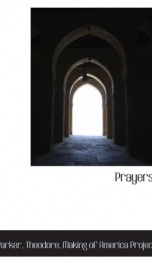
prayers
Series:
Unknown
Year:
Unknown
Raiting:
4/5
Purchase of this book includes free trial access to www.million-books.com where you can read more than a million books for free. This is an OCR edition with typos. Excerpt from book: Teach us, O Lord, to use this world wisely and faithfully and well. In its daily duties and its trials may we find the school for wisdom, for goodness and for piety. May we learn hy every trial that thou sendest, be strengthened by every cross, and when we stoop in sadness to drink bitter waters, may we rise refreshed and invigorated. Help us to live at peace with our souls, disturbing no string on this harp of a thousand chords, but attuning all to harmony, and in our life living one great triumphant hymn to thee. Withhold from us what is evil, though we beg mightily for it, and with tears and prayers. Help us to live in unity with our brother men, reconciling our interest to their interests, by faithfully discharging every duty, by patiently bearing with the weakness or the strength of our brothers, and loving them as we love ourselves. Teach us, Father, to love the unlovely, to love those who evil entreat us, to toil for those who are burdens in the world, and to seek to save them from ignorance, to reform them of their wickedness, and to hasten that time when all men shall recognize that thou art their Father, and their brothers are indeed their brothers, and that all owe fidelity to thee and loving-kindness to their fellow-men. Help us to live in unity with thee, no sloth hiding us from thy presence, no passion turning us aside from thy counsel, but, with mind and conscience, with heart and soul, assimilating ourselves to thee, till thy truth dwells in our understanding, and thy justice enlightens our conscience, and thy loveshines a beatitude and a blessed light in our heart and soul for ever and ever. In times of darkness, when men fail before thee, in days when men of high degree are a lie, and those of low degree are a vanity, teach us, O Lord, to be true before thee, ...
Show more
add to favoritesadd In favorites
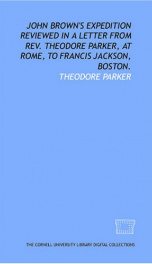
john browns expedition reviewed in a letter from rev theodore parker at rome
Series:
Unknown
Year:
Unknown
Raiting:
4/5
Originally published in 1860. 22 pages. This volume is produced from digital images from the Cornell University Library Samuel J. May Anti-Slavery Collection
Show more
add to favoritesadd In favorites
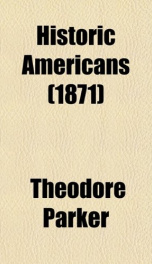
historic americans
Series:
Unknown
Year:
Unknown
Raiting:
4/5
Purchase of this book includes free trial access to www.million-books.com where you can read more than a million books for free. This is an OCR edition with typos. Excerpt from book: by his councillors, as Adams, and even as Washington, had often been. He did not change them in eight years: they were a unit. He removed the Federal leaders from all the most important offices. How else could he get rid of them? "Few die," said he, " and none resign." But he intended not more than twenty removals in all. Of course those who went out looked grim at those who came in, lean with expectation. Jefferson would have rotation in office. Here are the six chief acts of his administration. 1. He abandoned the defences of the country.. Upon the ground of expediency, he opposed the fortification of the principal harbors, and he considered the establishment of a Military Academy not within the specific powers assigned to Congress. While he was Vice-President, he and his Republican party had vehemently opposed a Navy, as being altogether unsuited to the means of the United States, and as being likely to involve the country in war. In this he opposed and obstructed the policy very much favored by Mr. Adams. And, consistently with these principles, when he himself came into power, he neglected the Army and Navy, and insisted upon building two hundred and fifty gunboats, which should cost but five thousand dollars each, instead of constructing larger and more efficient ves- eels, which would require the permanent employment of naval officers and seamen. It was Mr. Jefferson's plan, that in time of peace these gunboats should be hauled up under sheds, erected for the purpose on the sea-shore; and that in war time they should be fitted for service, and manned with a maritime militia, enlisted temporarily for the purpose. This scheme was violently attacked, and in fact it proved a failure. Mr. Jefferson employed Thomas Paine to write in defence of it. He certainly wrote very...
Show more
add to favoritesadd In favorites

genealogy and biographical notes of john parker of lexington and his descendants
Series:
Unknown
Year:
Unknown
Raiting:
4/5
This is a reproduction of the original edition including imperfections. Included with the purchase of this book is free trial access to Million-Books.com where you can read more than a million books for free, including many of the greatest books of all time like: * The complete works of Shakespeare, Charles Dickens, Mark Twain * Swift's Gulliver's Travels * Defoe's Robinson Crusoe * Thackeray's Vanity Fair * Jane Austen's Sense and Sensibility and Pride and Prejudice * Sigmund Freud's Interpretation of Dreams * Albert Einstein's Relativity * F. Scott Fitzgerald's Great Gatsby * George Orwell's 1984 * Milton's Paradise Lost * Smith's Wealth of Nations * Darwin's Origin of Species * Aristotle's Ethics * Plato's Dialogues * Thos. Ã Kempis' Imitation of Christ * Hume's History of England * Carlyle's French Revolution * Gibbon's Decline and Fall of the Roman Empire * . . .and more than a million more books These books have been a source of inspiration, joy and enlightenment to millions through the ages. Now they can all be yours.
Show more
add to favoritesadd In favorites

biography of mrs jh conant the worlds medium of the nineteenth century be
Series:
Unknown
Year:
Unknown
Raiting:
5/5
Show more
add to favoritesadd In favorites

an address delivered by the rev theodore parker before the new york city anti
Series:
Unknown
Year:
Unknown
Raiting:
5/5
Show more
add to favoritesadd In favorites

an address delivered by the rev theodore parker
Series:
Unknown
Year:
Unknown
Raiting:
5/5
Show more
add to favoritesadd In favorites

additional speeches addresses and occasional sermons volume 2
Series:
Unknown
Year:
Unknown
Raiting:
5/5
Show more
add to favoritesadd In favorites

additional speeches addresses and occasional sermons volume 1
Series:
Unknown
Year:
Unknown
Raiting:
4/5
Show more
add to favoritesadd In favorites

a sermon of the moral condition of boston preached at the melodeon on sunday
Series:
Unknown
Year:
Unknown
Raiting:
4/5
Show more
add to favoritesadd In favorites
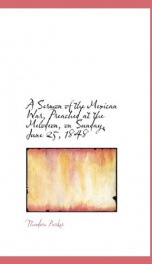
a sermon of the mexican war preached at the melodeon on sunday june 25 1848
Series:
Unknown
Year:
Unknown
Raiting:
4/5
Show more
add to favoritesadd In favorites
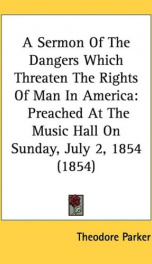
a sermon of the dangers which threaten the rights of man in america preached at
Series:
Unknown
Year:
Unknown
Raiting:
4/5
Show more
add to favoritesadd In favorites

a sermon of slavery delivered jan 31 1841 repeated june 4 1843 and now pub
Series:
Unknown
Year:
Unknown
Raiting:
4/5
Show more
add to favoritesadd In favorites
What readers are saying
What do you think? Write your own comment on this author!
write a commentif you like Parker Theodore try:
readers also enjoyed
What readers are saying
What do you think? Write your own comment on this author!
write a commentGenre
if you like Parker Theodore try:
readers also enjoyed
Do you want to read a book that interests you? It’s EASY!
Create an account and send a request for reading to other users on the Webpage of the book!

